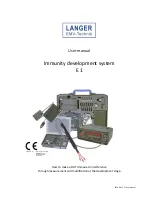
Getting Started with
F.FSHF11
CHECKLIST
Packing List
eMerge50P or eMerge5000P
Plug-in Power supply (PIP)
Data Required
Static IP addresses for the
eMerge
controller, the
eMerge
node, and a local PC
or laptop
Subnet mask
Gateway
DNS 1 and DNS 2 (optional)
Tools and Resources
Mounting hardware
AC power for the supplied PIP, or DC power from a separate circuit with an
isolated earth ground
Wire (if using supplied PIP): Twisted 16 AWG Belden
(2 conductor) or equivalent. Maximum distance 10 feet (3.048 meters)
Ethernet cable: CAT 5 or better with an RJ-45 connector
Local PC or laptop (for setting controller IP values)
Internet Explorer 8.0 or 9.0 running on Windows XP or Windows 7
1
Mount the Wall Cabinet, Wire the PIP
STEPS
Mounting the Wall Cabinet
Mounting hardware should be sufficient to hang a 25 pound (11.34 kg) load. Wall
space required to fully open the cabinet door is twice the width of the cabinet, or
26 inches.
The door opens from right to left as you face the cabinet. It is recommended that
the cabinet be mounted in a location where the door can be fully opened.
1. Mount the two keyholes near the top of the cabinet.
2. Drill the lower hole, using the cabinet as a template.
Wiring the Supplied PIP
The PIP must be powered with 100-240VAC, 50-60 Hz.
1. Attach the black (ground) wire to the negative pin (pin 4) on the PIP, and
the red, positive wire to the positive pin (pin 1) on the PIP.
2. Pull the wiring through a knockout in the cabinet.
3. Connect the black (ground) wire to the left side of the junction block, and
the positive (red) wire to the right side of the junction block.
2
Connect the PIP or a DC Power Source
STEPS
WARNING:
Observe static electricity precautions when handling and installing
system components, which can be damaged by static discharge.
Connecting the PIP (or a DC power source) to the system
Power must come from a
separate circuit
with an isolated earth ground. If DC
power is provided directly to the junction block, it must have 12VDC at a minimum
of 3 Amps.
1. Ensure the DC power source is off, then pull the wiring through a knockout
in the cabinet.
2. Connect the ground (black) wire to the left side of the junction block, and
connect the red wire to the right side of the junction block.
Important:
Do not apply power to the system until all connections have been made for
readers, inputs, outputs, and temperature sensors.




















